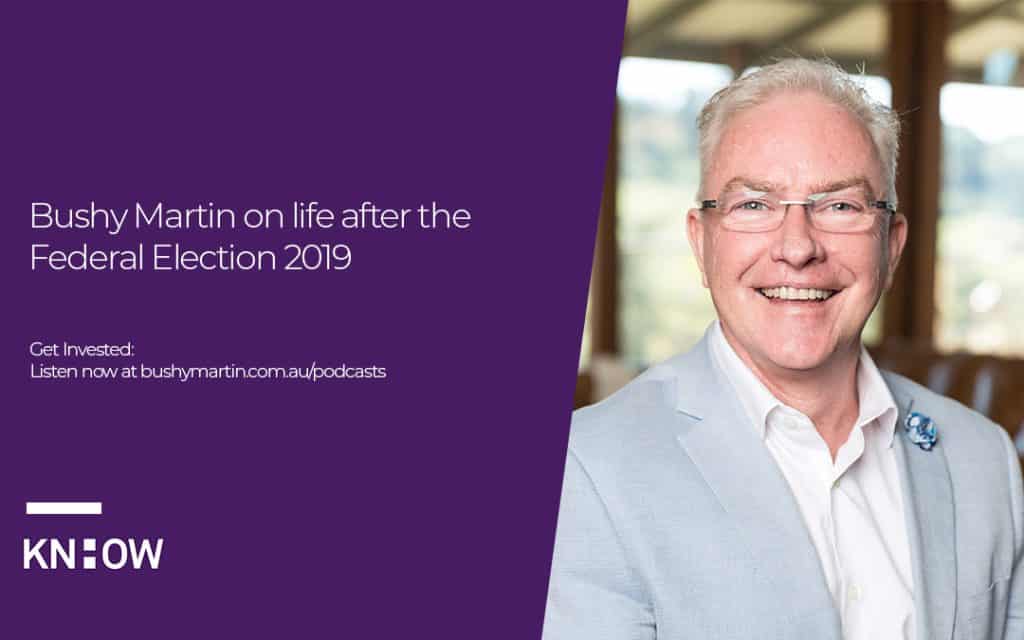When the Liberal Party retained power of the Australian government in May 2019, investors breathed a collective sigh of relief.
The cloud over the property market cleared, among other threats, and the future looked bright again.
So the big question for investors and everyday Australians – what’s next?
On the Get Invested podcast, Bushy Martin talked about the opportunities and challenges ahead. Here’s an excerpt:
“Now, it’s fair to say that I believe that the result in the recent federal election meant that many of us who are property owners and have an interest in property all dodged a bullet. There’s no doubt it was a looming cyclone on the horizon, and we’ve managed to avert this. And for me and many others we’ve all had a massive sigh of relief. In fact, I was very shocked at the result of the election on the 18th of May, and it’s fair to say you would have seen me doing ‘the Toyota jump’ at the outcome. Now the national Labor Party have been returned, and while I don’t have any affiliations either way, policy impacts on investors is what it’s all about for me. Not interested in the political personality politics, but, it’s fair to say that we really have averted some pretty troubling times.
“Now, what’s interesting for me, is that the result was very much despite repeated indications to the contrary over the last three years, and it also restored some confidence in the intelligence of the silent majority. But it also seriously questions the legitimacy of the election polls and the abilities of the mainstream media to really know what’s going on, because I keep asking how could they get it so wrong for so long? But let’s not get distracted, let’s stay on track here, because the simple fact is that the election result effectively means no change. We really have averted what was going to be a major tax revolution with more change potentially, than we’ve ever seen in the country, in that regard. So the result means no changes to negative gearing, no changes to capital gains tax, no change to finance brokering remuneration, which will maintain bank competition. No change to trust taxation, no change to franking credits on shares, and no change to the watering down of proposed tax cuts that was going to appear if Labor got in.
“Now I guess this all reinforces the old adage that if it ain’t broke, then why fix it? And this seems to have been the prevailing outcome. So on top of no change, we’re also likely to see some improvements in terms of tax cuts over the next few years, some major infrastructure spend which will help employment and is always a good thing for property. We’ve already seen the first of what will be a number of rate cuts and the really good news is that we’re starting to see a potential relaxation in lending policy.
“So what does this all mean? Well, in really simple terms, the economy and property performance relies on what I call ‘the three c’s’.
“Which is the really delicate, dynamic balance between confidence, certainty, and credit. So what I mean by that is that confidence, generally, is driven by the level of certainty, and our access to credit. So from a certainty perspective, it’s fair to say that the uncertainty has been removed. There’s been a lot of people sitting on the sidelines in property over the last twelve to eighteen months. But now we’ve got some good news on the horizon, and as I say, we’re seeing rate reductions together with potential lending policy relaxation.
“Now, if we look at the credit side, I’ve always said that property is a game of finance. And with the recent reserve bank interest rate cut, it means that money has never ever been cheaper, but we need to now keep in mind that with the lenders’ lending policy tightening that’s occurred as result of the Royal Commission, Productivity Commission reviews, that it doesn’t matter how cheap the money is if you can’t get your hands on any.
“Now, this has meant that in recent years, the pressure by the government on the banks has meant that the reduction in property values that we’re seeing particularly in Sydney and Melbourne have been the result of a self-fulfiling prophecy, where turning off the tap in relation to access to finance, means that dampens demand, which means that property values cease. Now the really good news for me which is the piece that we’ve been waiting for is that, a couple of days after the election, APRA announced that they’re putting pressure to reduce the loan servicing rate, which the banks are currently using, which I believe will potentially be the start of bigger things to come. So that will start to see money flowing more freely, and that is really good news. Now if we look broader than that, the economy generally is also going to benefit from the tax cuts so that’s going to mean more money in our pockets, the rate reductions will mean that well have less costs, and that big investment in infrastructure projects means good news for property and property owners.”
Listen to the full podcast here.
Want to Know How you can build wealth with the help of leading, qualified experts? Talk to the team at KnowHow, now.




